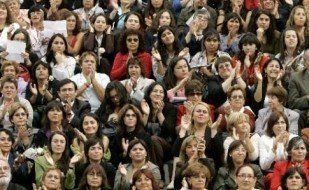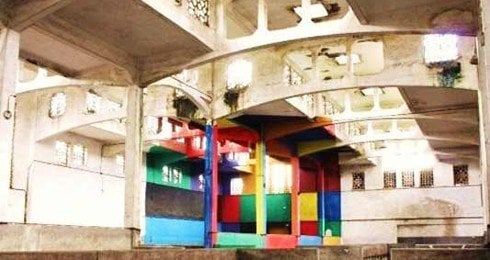Young Mediterranean Women
Morocco: Between Survival and Self-assertion
2008: 4 years have passed since the reform of the Family Code. Casablanca, a population of 3.5 million (officially), economic capital and melting pot of ancient resident and rural populations who have come to seek employment, of middle classes…
Amal, Leyla, Ikram, Ghanya, Amina and Kawtar live their twenties here. What are their lives, their dreams? It all depends on their social condition. Their priority: to work.
Ghanya: Work means survival
Ghanya, aged 27, came to work in Casablanca. This young lively but modest woman comes from Chichawa, a small town near Marrakech. The youngest of 8 children she only attended a year of school: “My parents registered me but I wanted to leave. I don’t regret it”. Though she can’t write or read, she currently works in a café and runs from office to office to serve the clients. “This is what I found. I earn 250DH per week. It’s enough for me and to help my parents out. Work is important”. It’s a question of survival.
Kawtar: Bored of daily routines
As for Kawtar, 27, a native of a working-class neighbourhood of Casablanca, a job would change her life. She married when she was 21 and has two young children used to seeing her permanently at their service. She doesn’t have a moment for herself and she gets bored with “doing the same things every day”. Her husband, a civil servant much older than her, struggles to make them live honourably: this leads to nervousness, frustration and marital problems.
Amina: Wants her daughters to be better-off
Amina, 29 is divorced and lives with her parents and her two daughters. She loves her job as an aesthetician, though she regrets the looks of despise that people give her. She endures long days of underpaid work in order to be independent economically and suffers that she’s can’t completely manage on her own at her age.
Maternity is her greatest source of satisfaction, though she fights for her daughters because she wants them to have “a better situation than mine”. She can’t stop working but her dream of a “stable situation” could only come true with a husband.
Ikram: Women can't work late
Ikram, 22, believes that “work represents self-fulfilment. I plan to stop only if I marry a rich husband, to take care of my children during their growth”. A master student, she works as researcher for a shadow cabinet. She likes challenges, and reveals a very hard-nosed and proactive attitude in her professional carrier: “negative points help to form my personality”.
She regrets that “in Morocco, women can’t stay late at work: it creates problems to the family because of what people could say”.
Amal: Can stand up for her ideas
“I don’t just accept things for the sake of appearances; I take on my own responsibilities”, retorts Amal, 28, a young modern woman with a subdued elegance.
A TV journalist, she chose this job because she wanted “more freedom. Journalism allows you to be a free electron. I don’t live the monotony of office life. I can stand up for my own ideas. This wasn’t conceivable in my family before”.
Leyla: Her life appears rich from the outside
Leyla, the first of 3 children, belongs to a middle class family of Fez, therefore traditional and conservative. Aged 28, she is responsible for the institutional communication of a multinational firm. This branch is still to be “legitimised” but she appreciates the fact of “having a budget and really being able to achieve something”.
Lively and curious, but heavily marked by her education, she questions herself often on her desires and choices: “I live a rich life outwards but a poor one inwards”, she explains, admiring her cousin who is a happy mother with a family of her own.
A Difficult Emancipation
Whereas work represents a boost for the richer women, marriage represents a mandatory stage for all of them. “That’s life”, replies Ghanya who believes that “a woman should live in her house with her children” and that only the hardships of life force women to work. “I live day by day. I eat, I drink, Hamdoullah (Thanks God). I don’t dream of the future”.
Her only hope is to meet “someone of my own class and be happy with him”. It’s difficult to leave home before you’re married. A woman’s freedom depends on that. At what price, remembers Amina bitterly. Women seldom live on their own without being married. All of them are aware that the high cost of life won’t allow them to have more than two children.
Love, liaisons, abortions
Where does love stand in all of this? “I’m not interested”, replies Ghanya shrugging her shoulders. Ikram, a strict Muslim follower, veiled and dressed accordingly, believes that “true love comes after marriage” and deprives herself of any sentimental relationship.The independence she shows for her professional career leaves the way on this field to ideological considerations. Ideal love? “It’s the love of the Prophet for Aysha”. She doesn’t trust men.
Amina regrets the traditional stability that her parents lived, in respect and tenderness” “Today, men want to depend on women. They’ve given up. Women work five times as much than men and don’t get any recognition for it”.
Liaisons? Only for the more emancipated ones. To remain a virgin until the wedding? “Because men care for it even if they pretend the contrary”, adds Kawtar realistically. To declare your love to a man? Few women allow themselves to do so, but many use indirect stratagems.
Contraception? They all know about it, though it wasn’t their mothers who informed them: Hchouma (Shame on you). Abortion? Only the most modern ones want a legislation to authorise it. For most of them it’s Haram (It’s a sin). “It’s not a solution”, believes Kawtar, who recalls her abortion “in painful and dangerous conditions”. In very extreme cases, “Only God can forgive us…”whispers Amina.
Intergenerational relations
Many believe that their life is very different from their mothers, because they work, though Leyla specifies:” we’re conditioned in the same way. I suffer the same constraints (studies, marriage, children, way of life) but a little later”.
Some would hope for more dialogue with their parents. When asked what they think of themselves, they laugh surprised. They live, that’s all, without really asking themselves what they are as individuals. Yet, what they prize most are the moral qualities: to follow a moral conduct for the simplest of them, to have strength of character and independence for the more emancipated ones.
So, are they happy? Their yes is often shy, though they more often reply with a modest Hamdoullah…(KS/AG)








